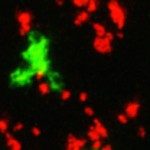Lien vers Pubmed [PMID] – 27698437
Lien DOI – 10.1038/srep34382
Sci Rep 2016 10; 6(): 34382
Anti-CD20 monoclonal antibodies (mAbs) represent an effective treatment for a number of B cell malignancies and autoimmune disorders. Glycoengineering of anti-CD20mAb may contribute to increased anti-tumor efficacy through enhanced antibody-dependent cellular cytotoxicity (ADCC) and phagocytosis (ADP) as reported by in vitro studies. However, where and how glycoengineered Ab may potentiate therapeutic responses in vivo is yet to be elucidated. Here, we have performed mouse liver transplants to demonstrate that the liver is sufficient to mediate systemic B cells depletion after anti-CD20 treatment. Relying on intravital two-photon imaging of human CD20-expressing mice, we provide evidence that ADP by Kupffer cells (KC) is a major mechanism for rituximab-mediated B cell depletion. Notably, a glycoengineered anti-mouse CD20 Ab but not its wild-type counterpart triggered potent KC-mediated B cell depletion at low doses. Finally, distinct thresholds for KC phagocytosis were also observed for GA101 (obinutuzumab), a humanized glycoengineered type II anti-CD20 Ab and rituximab. Thus, we propose that enhanced phagocytosis of circulating B cells by KC represents an important in vivo mechanism underlying the improved activity of glycoengineered anti-CD20 mAbs.


